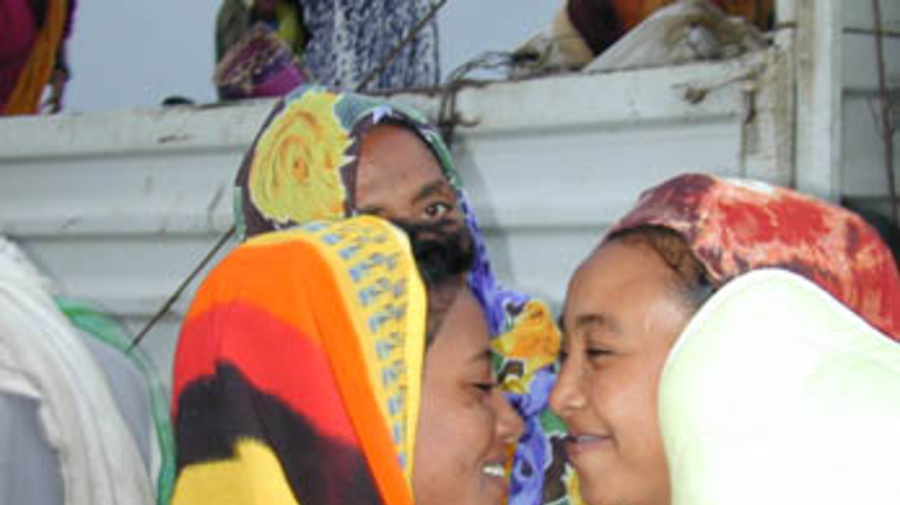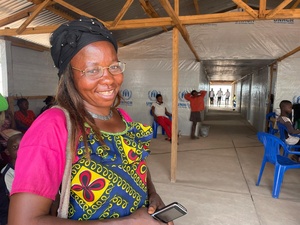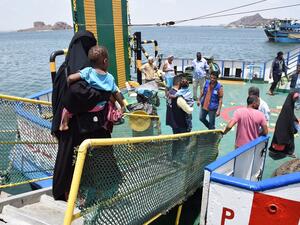Returnees express hope, uncertainty as long exile ends
Returnees express hope, uncertainty as long exile ends

Returnees aboard the trucks taking them on the three-day journey from Sudan to Ethiopia. UNHCR/N.Kanhema
PORT SUDAN, Sudan - Hadas Merese was 18 when she lost her family during the reign of Ethiopia's Mengistu Haile Mariam. To save her own life, she was forced to flee to neighbouring Sudan, where she joined thousands of other Ethiopians who were similarly driven into exile during Mengistu's iron-fisted rule.
Although the Mengistu regime (1974-91) fell a decade ago, Hadas still had mixed feelings recently as she prepared to end years of exile and join her husband in Ethiopia, where she had never lived as an adult.
"My husband went back some time ago and he has written to me asking me to bring his children," she said. "I came here 20 years ago. I have made friends here. I have had my children here, but I have no family back in Ethiopia. My husband wrote that he wants his children to grow up in Ethiopia, but I am not sure he still wants me. If he doesn't, then I have no one and nowhere to turn to," said Hadas as she waited recently in the Red Sea town of Port Sudan to board a truck to take her back to Ethiopia.
Hadas is one of 10,700 Ethiopian refugees who have volunteered to return home with UNHCR's help. She and other refugees in Port Sudan were bracing themselves for an arduous three-day journey in open trucks. On the day they left, the Sahara was as brutal as ever, blowing hot wind and dust toward the Red Sea.
The story of the pre-1991 Ethiopian refugees - one of the world's oldest exile populations - is as dramatic and full of twists as the history of the Horn of Africa itself. Some of the refugees came to Sudan as teenagers, grew into adulthood and have become parents themselves. Others were born in Sudan, sometimes to Sudanese, but also to other nationalities, including to Eritrean mothers or fathers.
UNHCR has been negotiating with Sudan, Ethiopia and Eritrea for much of the last decade to resolve the Horn's protracted refugee crises. Now, most of Sudan's remaining Mengistu-era Ethiopians are finally going home.
Many of these Ethiopians are facing tough dilemmas, and few are going back without hesitation. Some are in the midst of university studies and cannot switch to the Ethiopian educational system. Others have found jobs in Sudan and are uncertain whether they will be able to find work back home in Ethiopia.
Sudan, a nation torn by civil war and plagued by natural disasters, has hosted Ethiopians and Eritreans for decades. But it has no provision to integrate foreigners, regardless of how long they have lived there. This makes return the only viable option for Sudan's remaining Ethiopian and Eritrean refugees.
Belanishe, a 32-year-old woman clutching a 5-month-old baby, had a swelling black and blue eye on the day of her departure. Giggling, she first said she had fallen. Then she changed her story, acknowledging that her decision to return had split her family apart and resulted in her black eye.
"When my husband Daniel saw that I was serious with my plans of returning to Ethiopia together with the baby, he got so angry that he punched me in the face," she said. "But it has been so long since I have been home that no one will stop me."
The couple cannot go to Ethiopia together because Daniel is from Eritrea, a country that finished its second war with Ethiopia last year. He fears that his life would be in danger if he went to Ethiopia now.
On the eve of his wife's departure Daniel was torn. He wanted the baby to remain with him in Port Sudan because he feared that he might lose it if Belanishe decided to take the baby to Ethiopia. At the same time, he recognized that he could not look after the baby on his own.
"I will wait for the day Eritreans will be repatriated and I will also return home," said Daniel. "When we finally have peace between Ethiopia and Eritrea, I will then go to Ethiopia and get my family. If I go today, I will be suspected of all sorts of things."
Some 200,000 Eritrean exiles like Daniel remain in Sudan. Organizing their return is now UNHCR's main regional focus.
By Newton Kanhema
UNHCR Nairobi
(Editor's Note: By mid-March of 2001, UNHCR had helped return 10,700 pre-1991 Ethiopian refugees in Sudan who had volunteered to go home. Some had been in exile for more than 30 years. The operation began in Dec. 2000 and will ultimately result in the closure of some of the oldest refugee camps in the world. The operation followed UNHCR's implementation in March 2000 of the so-called "cessation clause" for Mengistu-era refugees, ruling that as a group, they no longer had compelling reasons to fear return.)








